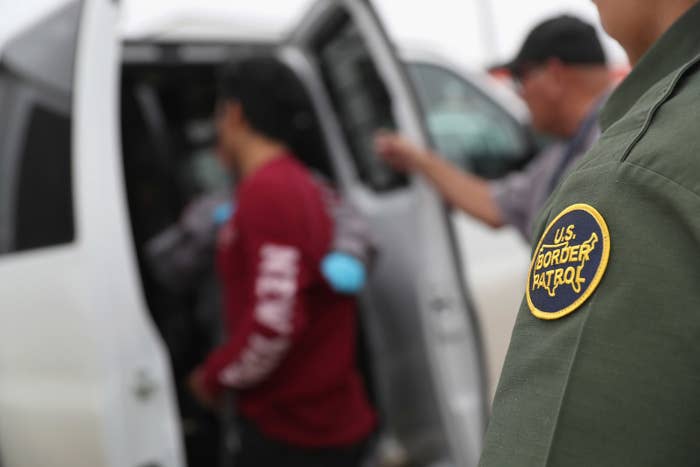
The backlog of cases in US immigration courts has continued to worsen amid the Trump administration's border crackdown, new statistics show.
As of the end of July, there were 617,527 cases pending in immigration courts. It's the first time this number has crossed the 600,000 mark, according to information released on Thursday by the Transactional Records Action Clearinghouse, or TRAC, a research center at Syracuse University that tracks US government data.
The immigration court system, which is an arm of the US Department of Justice, has been grappling with growing caseloads for years. Immigration judges and lawyers have reported case delays stretching years out. But the latest numbers show a large jump in 2017. When Trump took office in January, there were approximately 540,000 pending cases.
"It is still overwhelming to the immigration judges," said Judge Dana Leigh Marks, an immigration judge in San Francisco and president of the National Association of Immigration Judges. "The levels of caseload are higher than we've ever seen before."
Immigration courts are typically the first stop in the justice system for immigrants who aren't immediately deported under an expedited process that applies only to certain individuals caught near the border. Lawyers from the US Department of Homeland Security prosecute the cases. The defendants are not entitled to a lawyer. Deportation orders and other rulings can be appealed to the Board of Immigration Appeals, which is also part of the Justice Department, and then to a federal appeals court.
Since Trump announced ramped up border enforcement measures in January, the Justice Department has temporarily assigned immigration judges from across the country to sit in courts closer to the US–Mexico border, and has hired more judges. But the latest numbers from TRAC suggest those measures haven't been enough to make a dent in the backlog.
Marks said that the jump in pending cases was due in part to the fact that under the Trump administration's policies, immigration officials were increasingly denying parole to individuals suspected of unlawfully being in the United States and were detaining them; immigration authorities have discretion to grant parole for "humanitarian or significance public benefit" reasons while cases are pending. Detained individuals get priority in court — judges can then make a decision about whether to release them — which pushes back cases already in the system.
A Justice Department spokesperson said that the Executive Office for Immigration Review, which manages the immigration courts, is "actively engaged in a multi-front effort to reverse the growth in the backlog." That effort includes hiring more judges and maximizing courtroom time by using video teleconferencing for some cases.
The office is also "reviewing internal practices, procedures, and technology in order to identify ways in which it can further enhance immigration judge productivity without compromising due process," the spokesman said.
Between fiscal years 2015 and 2016 — the fiscal year ends on Sept. 30 — the number of pending cases grew by approximately 60,000. There are still two months left in the 2017 fiscal year, and the backlog as of the end of July is already up by more than 100,000 cases from 2016.
As of Aug. 14, there were 334 immigration judges nationwide — 54 have been hired since Trump took office. The office is authorized by Congress to have 384 judges. Marks said that a large number of judges are eligible to retire, which could cut into any progress that DOJ makes in hiring new judges. New judges also don't move as quickly as experienced ones, she said.
Under a Jan. 25 executive order on immigration enforcement, the Justice Department said in August that it had mobilized more than 100 immigration judges to hear cases at Department of Homeland Security detention facilities, either in-person or by video teleconferencing. Between Feb. 1 and July 31, immigration judges had issued nearly 28 percent more deportation orders as compared to the same time period last year, DOJ said.
Marks said that immigration judges had been warning officials about the backlog for years, and would continue to do so.
"The canaries in the coal mine are still gasping for air," she said.
This story was updated with comments from Judge Dana Leigh Marks and a Justice Department spokesperson.

